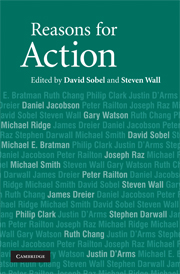Book contents
- Frontmatter
- Contents
- Notes on the contributors
- Acknowledgments
- 1 Introduction
- 2 Intention, belief, and instrumental rationality
- 3 Reasons: practical and adaptive
- 4 The explanatory role of being rational
- 5 Practical competence and fluent agency
- 6 Practical conditionals
- 7 Authority and second-personal reasons for acting
- 8 Promises, reasons, and normative powers
- 9 Regret and irrational action
- 10 Mackie's motivational argument
- 11 The truth in Ecumenical Expressivism
- 12 Voluntarist reasons and the sources of normativity
- Bibliography
- Index
5 - Practical competence and fluent agency
Published online by Cambridge University Press: 05 May 2010
- Frontmatter
- Contents
- Notes on the contributors
- Acknowledgments
- 1 Introduction
- 2 Intention, belief, and instrumental rationality
- 3 Reasons: practical and adaptive
- 4 The explanatory role of being rational
- 5 Practical competence and fluent agency
- 6 Practical conditionals
- 7 Authority and second-personal reasons for acting
- 8 Promises, reasons, and normative powers
- 9 Regret and irrational action
- 10 Mackie's motivational argument
- 11 The truth in Ecumenical Expressivism
- 12 Voluntarist reasons and the sources of normativity
- Bibliography
- Index
Summary
INTRODUCTION
My first attempts to drive a car were torture – for myself, my older brother (who unwisely had agreed to help teach me), and the family car. The car had a manual transmission and clutch, and we bucked and lurched around town. Each intersection, even each gear shift, posed a challenge that demanded my full attention – if only I could have given it. Instead, my mind was churning with embarrassment at my incompetence, driven to fever pitch by the chorus of horns that greeted me each time I stalled in traffic. I could barely follow the simplest directions from my brother, and his occasional attempts to calm things down with conversation fell on deaf ears. Despite himself, he groaned quietly as I ground the gears and lugged the engine.
Like everyone, I eventually I got the hang of driving – the way we eventually get the hang of talking, eating without a bib, telling a joke without ruining it, finding our way in a strange city, or politely discouraging an over-eager salesman. What had changed about me as a driver? Not my rationality. It was not irrational of me to drive when I was so annoyingly clumsy at it – I had to learn, and there was no other way. My driving was incompetent, but not really dangerous. True, I was responding badly to the available reasons. So I was not a good detector of or responder to reasons. But not out of irrationality.
- Type
- Chapter
- Information
- Reasons for Action , pp. 81 - 115Publisher: Cambridge University PressPrint publication year: 2009
- 68
- Cited by

